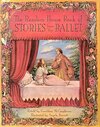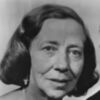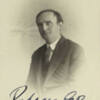Geraldine McCaughrean
Author of Peter Pan in Scarlet
About the Author
Geraldine McCaughrean was born in Enfield, England on June 6, 1951. She was educated at Christ Church College, Canterbury. She has written more than 160 books and plays for children and adults. Her writing career includes the retelling of such classics as One Thousand and One Arabian Nights, The show more Canterbury Tales, and The Bronze Cauldron: Myths and Legends of the World, which is a collection of stories from all over the world. She has received numerous awards including three Whitbread Children's Book Awards for A Little Lower Than the Angels, Gold Dust, and Not the End of the World. She also received the Guardian Prize and Carnegie Medal for A Pack of Lies, the Beefeater Children's Novel Award for Gold Dawn, the Michael L. Printz Award for The White Darkness, and the 2018 Carnegie Medal for children's and YA books for her middle-grade novel Where the World Ends. (Bowker Author Biography) show less
Image credit: Channel 4 Learning
Series
Works by Geraldine McCaughrean
Athena and the Olive Tree / Who is the Fairest One of All? / The Woman No One Believed (2000) 24 copies
O lago dos cisnes 1 copy
Ancient Myths Collection 1 copy
Á hjara veraldar 1 copy
100 English Lessons for the National Curriculum for teaching ages 8-9 (Year 4). Includes short term planning and… (2014) 1 copy
Bill's New Frock: teaching activities for guided and shared reading, writing, speaking, listening and more! (Read &… (2016) 1 copy
War Horse: teaching activities for guided and shared reading, writing, speaking, listening and more! (Read & Respond) (2016) 1 copy
nativity story (The) 1 copy
UN MUCCHIO DI BUGIE 1 copy
Associated Works
Dare to be Different - A Cebration Of Freedom In association With Amnesty International (1999) — Contributor — 13 copies
Maitokulho ja kolme muuta hyvänyöntarinaa — Author — 1 copy
Tagged
Common Knowledge
- Other names
- Jones, Geraldine (birth)
- Birthdate
- 1951-06-06
- Gender
- female
- Nationality
- UK
- Birthplace
- North London, England, UK
- Places of residence
- Berkshire, England, UK
- Occupations
- children's book author
- Relationships
- Jones, Neil [1] (brother)
- Awards and honors
- Royal Society of Literature ( [2010])
Carnegie Medal - Short biography
- Geraldine McCaughrean has written more than 125 books, been published in twenty-five countries, and won a dozen major awards, including the prestigious Carnegie Medal. She lives in Berkshire, England with her husband John, daughter Ailsa, and Daisy the dog. [from Casting the Gods Adrift (2002)]
Members
Reviews
The tiny island archipelago of St. Kilda, Scotland, is remote and harsh. In the 1700s, a small community lives on Hirta, and each year, they send a small party of men and boys to Warrior Stac to capture birds and gather eggs and feathers. The boat that drops the party off is supposed to return for them in two weeks - but it doesn't. Theories abound, and one small boy has a vision of the others being taken up during Judgment Day. Fearing they are left entirely alone in the world, the boys and show more men struggle against despair. One man sets himself up as minister; one boy bullies the others; one boy turns out to be a girl. Many find their unique strengths (Keeper of Stories, Keeper of Music, Keeper of Faces), and there are as many heroic actions as cowardly ones. Eventually - nine months later - a rescue ship arrives, with the sad (but not otherworldly) news that smallpox has devastated the population of Hirta in their absence.
The narrator is revealed at the end, but the story belongs most to Quilliam, a steady boy who is called King Gannet, and calms the others by telling stories. He in turn takes comfort from the memory of Murdina Galloway, the niece of one of the men on Hirta, who visited from the mainland before the fowling trip.
See also: The Book of Boy by Catherine Gilbert Murdock; Hatchet by Gary Paulsen
Quotes
When life is harsh, everyday-ordinary is to be cherished. Excitements come from bad things... (22)
And a thing not talked about barely exists, doesn't it? (39)
"What cannot be altered must be endured." (Col Cane, 40)
Every day someone else came face-to-face with the same thing. That moment, when fretting turned to knowing for certain: they were all alone. No one was coming. (69)
Like an oyster that swallows sharp grit then shuts its lips tight, Farriss rarely put his feelings into words. (85)
...Quill saw the boys close their eyes and check inside their eyelids for memories of friends and family; he knew that was what they were doing, because he had just done it himself. Remembered pictures are like water: the harder you try to hold on to them, the more surely they run away. He did not know what to say...it is unbearable to lose the memory of a face. (123)
"Sevenfold blessings to our friends, and the strong rope in time of need!" (toast, 180)
Something, if not the world, had ended. (280)
"We have a saying here: After the world ends, only music and love will survive." (Quill to Murdina, 307)
From the Afterword:
The truth is that a party of eight (not nine) boys and three men went over to Stac an Armin, also known as Warrior Stac, from Hirta and were marooned there for nine months.
They all lived - almost impossible to believe, but they did.Only the extraordinarily harsh everyday lives they were already living can ave equipped them to survive the ordeal. show less
The narrator is revealed at the end, but the story belongs most to Quilliam, a steady boy who is called King Gannet, and calms the others by telling stories. He in turn takes comfort from the memory of Murdina Galloway, the niece of one of the men on Hirta, who visited from the mainland before the fowling trip.
See also: The Book of Boy by Catherine Gilbert Murdock; Hatchet by Gary Paulsen
Quotes
When life is harsh, everyday-ordinary is to be cherished. Excitements come from bad things... (22)
And a thing not talked about barely exists, doesn't it? (39)
"What cannot be altered must be endured." (Col Cane, 40)
Every day someone else came face-to-face with the same thing. That moment, when fretting turned to knowing for certain: they were all alone. No one was coming. (69)
Like an oyster that swallows sharp grit then shuts its lips tight, Farriss rarely put his feelings into words. (85)
...Quill saw the boys close their eyes and check inside their eyelids for memories of friends and family; he knew that was what they were doing, because he had just done it himself. Remembered pictures are like water: the harder you try to hold on to them, the more surely they run away. He did not know what to say...it is unbearable to lose the memory of a face. (123)
"Sevenfold blessings to our friends, and the strong rope in time of need!" (toast, 180)
Something, if not the world, had ended. (280)
"We have a saying here: After the world ends, only music and love will survive." (Quill to Murdina, 307)
From the Afterword:
The truth is that a party of eight (not nine) boys and three men went over to Stac an Armin, also known as Warrior Stac, from Hirta and were marooned there for nine months.
They all lived - almost impossible to believe, but they did.Only the extraordinarily harsh everyday lives they were already living can ave equipped them to survive the ordeal. show less
It is summer on the remote island of St. Kilda, and a group of men and boys are preparing for the annual hunting journey to Warrior Stac, a small, barren, rocky island in the outer Hebrides. A small boat ferries them to the outcropping and drops them off, and the small band immediately sets to work preparing a shelter for the next few weeks and commencing hunting of the seafowl who visit the island to nest this time of year. All goes swimmingly, their haul bountiful, until it becomes show more apparent that the return boat isn't coming for them.
I quite enjoyed this novel (I admit to being somewhat partial to survival/adventure tales), as well as McCaughrean's writing. For a while I thought we were heading down a road to full-blown Lord of the Flies, but thankfully, though it was at times disturbing, the breakdown of society didn't sink quite to that level, and the story had sufficient nuance and imagination to make it distinct. That it was based on true events was icing on the cake. show less
I quite enjoyed this novel (I admit to being somewhat partial to survival/adventure tales), as well as McCaughrean's writing. For a while I thought we were heading down a road to full-blown Lord of the Flies, but thankfully, though it was at times disturbing, the breakdown of society didn't sink quite to that level, and the story had sufficient nuance and imagination to make it distinct. That it was based on true events was icing on the cake. show less
The legend of King Wenceslas is retold in this lovely Christmas picture-book, with the lyrics to the traditional carol included at the rear. In this expanded version of the story, the page who accompanies the Bohemian king on his trek through a blizzard, in order to deliver some Christmas cheer to a peasant woodcutter, is named Peter. Although clearly not enthusiastic about the task at hand, Peter is determined not to let his master down. When it seem he cannot go a step further through the show more snow and cold, Wenceslas encourages him to step where he himself has stepped. And so Peter "followed in his master's footsteps…"
A clear metaphor for the Christian's relationship to God, the relationship between Peter and Wenceslas is given depth and emotional power in McCaughrean's retelling of the story. Although not historically accurate - there was a St. Wenceslas, involved in the conversion of Bohemia to Christianity, but the story contained in the carol was invented by John Mason Neale in 1853, when he penned the words to Good King Wenceslas - this still makes for an admiral and moving Christmas tale, one which emphasizes the importance of compassion and generosity, and of following in Christ's footsteps. I found the story moving, and appreciated the wintry landscapes captured in Christian Birmingham's artwork. The illustrations sometimes has a blurred, indistinct quality to them - they were almost impressionistic at times - but somehow that felt appropriate, as if we the readers were watching everything unfold through falling snow. Recommended to anyone looking for good Christmas picture-books and/or carol retellings. show less
A clear metaphor for the Christian's relationship to God, the relationship between Peter and Wenceslas is given depth and emotional power in McCaughrean's retelling of the story. Although not historically accurate - there was a St. Wenceslas, involved in the conversion of Bohemia to Christianity, but the story contained in the carol was invented by John Mason Neale in 1853, when he penned the words to Good King Wenceslas - this still makes for an admiral and moving Christmas tale, one which emphasizes the importance of compassion and generosity, and of following in Christ's footsteps. I found the story moving, and appreciated the wintry landscapes captured in Christian Birmingham's artwork. The illustrations sometimes has a blurred, indistinct quality to them - they were almost impressionistic at times - but somehow that felt appropriate, as if we the readers were watching everything unfold through falling snow. Recommended to anyone looking for good Christmas picture-books and/or carol retellings. show less
I picked this up because I love Angela Barrett's illustrations, and while I found much to admire, as always, in her art, I was most delighted by Geraldine McCaughrean's retellings. McCaughrean explains the stories behind the ballets with verve and clever touches of dialogue and detail, but she also manages to capture the very movement of the dance. I could almost imagine exactly how the characters might dance the story, how they'd exit and enter the stage, even how that stage might be show more dressed for Christmas or a city street, an ominous wood or a hidden castle. show less
Lists
Awards
You May Also Like
Associated Authors
Statistics
- Works
- 196
- Also by
- 10
- Members
- 11,590
- Popularity
- #2,025
- Rating
- 3.7
- Reviews
- 291
- ISBNs
- 877
- Languages
- 18
- Favorited
- 5
Charts & Graphs
Loading



























































